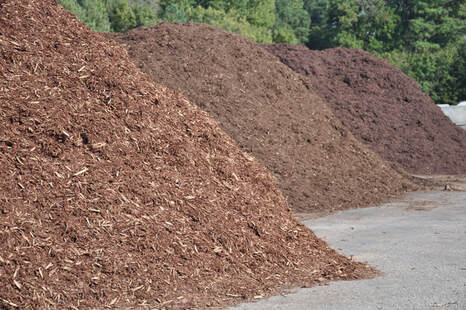 Mulch covers the soil and helps it retain water, stay frost-free, and keep nutrients. There are several different mulch types, each one with a somewhat different function. Cedar and pine mulches are both wood-chip mulches. However, the difference between pine and cedar mulch are significant, as they benefit the soil differently and have to be used in separate sections of your landscape. Advantages of Mulch Mulch comes in several forms, acting as a defensive layer for both the plant's roots and the soil. A few inches of mulch placed on the ground before the first frost will shield your plants' roots and guarantee that they live through the winter. Also, wood mulch breaks down and reloads the soil's nutrients that the plants use to thrive and flourish every year. A generous amount of mulch around your trees also deters weed growth. Pine Mulch Pine is a soft wood that breaks down easier than hard wood. This means that the soft wood mulch created won’t last as long as a hard wood mulch made with cedar. Pine mulch is best used in places that have a good number of plant turn-over, are replanted every year, or in spots with a considerable amount of plants where the plants are taking in a significant number of nutrients. Cedar Mulch Cedar mulch is a hardwood mulch that doesn’t break down quickly. It is best used on plants that grow gradually and in spots where there isn’t a lot of plants turn over. Cedar mulch is typically used around grown trees and shrubs. Also, cedar mulch is suitable for lining your garden paths, since it won't break down when you step on it. Cedar mulch lasts a very long time. How to Use Wood mulch is best used in autumn to safeguard your plants from frost and heavy rain. It shields the soil and halts a snap freeze from destroying the roots of your plants. You must cover all unplanted and exposed ground with around two inches of mulch. You can get organic, fresh mulch from any Rochester stump grinding business. Tip Pine is an acidic wood. Even though it breaks down gradually, it could still affect the pH balance of your soil. Therefore, be careful not to apply it around any plants that are sensitive to acidic soils. Comments are closed.
|
AuthorWrite something about yourself. No need to be fancy, just an overview. Archives
December 2020
CategoriesAll Insects & Diseases Questions & Answers Tools & Safety Trees & Landscaping Tree Stump Basics |
- Home
- Services
- About
- Contact
-
Service Areas
- Rochester NY Stump Removal
- Brighton Stump Removal
- Chili Stump Removal
- Churchville Stump Removal
- East Stump Removal
- Fairport Stump Removal
- Farmington Stump Removal
- Gates Stump Removal
- Greece Stump Removal
- Henrietta Stump Removal
- Irondequoit Stump Removal
- North Gates Stump Removal
- Parma Stump Removal
- Penfield Stump Removal
- Perinton Stump Removal
- Pittsford Stump Removal
- Victor Stump Removal
- Webster Stump Removal
- Blog
- Home
- Services
- About
- Contact
-
Service Areas
- Rochester NY Stump Removal
- Brighton Stump Removal
- Chili Stump Removal
- Churchville Stump Removal
- East Stump Removal
- Fairport Stump Removal
- Farmington Stump Removal
- Gates Stump Removal
- Greece Stump Removal
- Henrietta Stump Removal
- Irondequoit Stump Removal
- North Gates Stump Removal
- Parma Stump Removal
- Penfield Stump Removal
- Perinton Stump Removal
- Pittsford Stump Removal
- Victor Stump Removal
- Webster Stump Removal
- Blog
Search by typing & pressing enter

 RSS Feed
RSS Feed